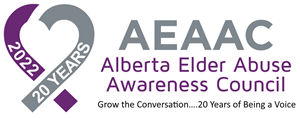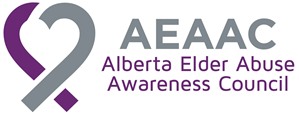Alberta Elder Abuse Awareness Council (AEAAC)
CFP Issue Date: June 21, 2024
CFP Closing Date and time: July 12, 2024 @4:30 pm
Email: elderabusealberta@gmail.com
This call for proposals (CFP) invites case managers and their coordinated community response (CCR) teams to submit a proposal to provide safe spaces to older adults within their community or region experiencing abuse or neglect.
This document describes the Call for Proposals (CFP) guidelines from the Alberta Elder Abuse Awareness Council. This is a confidential document.
Within the CFP you will find all the information necessary to apply for funding that will outline the scope of service provision, the deliverables and reporting requirements. In addition, it will provide information on the budgetary considerations.
Background Information
Elder abuse is any intentional or reckless act or willful and negligent disregard, occurring within a relationship of family, trust or dependency, directed at someone 65 years of age or older, that:
- Causes physical harm.
- Causes emotional or psychological harm
- Involves the misappropriation or misuse of money or other personal possessions or personal or real property.
- Subjects an individual to non-consensual sexual contact, activity or behaviour; or
- Fails to provide the necessities of life.
It is estimated that one in 10 seniors may be a victim of elder abuse. Older adults who are socially isolated are at a higher risk of experiencing elder abuse.
Elder abuse Safe Spaces are a valuable resource to support older adults fleeing abuse. Minimal supports exist in rural Alberta and Indigenous communities, therefore, there is a need for creating Safe Spaces in several communities for those older adults experiencing abuse, living in rural, remote and Indigenous areas will have older adults receive support in their chosen communities.
To enhance access to Safe Spaces for Older adults experiencing abuse, a Safe Spaces model in various communities will be used in a call for proposals across the province. The model will be based on the Lethbridge Elder Abuse Response Network (LEARN) Safe Suites model. The LEARN Safe Suites (Safe Spaces) model is flexible and responsive to demand and available resources. The model uses existing community infrastructure (e.g., local seniors housing providers) to match older adults in need of Safe Spaces with available suites.
The overarching principles of the Safe Spaces initiative include:
- Demonstrated demand for safe spaces for older adults experiencing abuse in the community
- Available spaces at local seniors' housing.
- Willing and able CCR partners.
- Sustainable partnership model.
- Cost efficiency.
The Safe Spaces model will be used in communities with active elder abuse CCRs and case managers. Older adults experiencing abuse will be referred to a Safe Space within their community or region by their local elder abuse case manager. The case manager will then work with the local housing body to find an appropriate suite for the older adult. The case manager will provide ongoing wrap-around support and case management before, during, and after their stay in the suite. The case manager and older adult will work together to determine the next steps and future safe living arrangements. The local housing body will bill the CCR for the cost of the older adult’s stay, based on a predetermined price.
This approach allows communities to design a model that addresses their unique geographic and cultural perspectives, including those of Indigenous, immigrant, and rural and remote communities. This approach has the potential to meet the unique needs of older adults who require additional levels of care (e.g., supportive living, continuing care), which may not be available at other shelters. The Safe Spaces model is not gender specific. To ensure the safety and security of older adults, other residents, and staff at housing management bodies, the Safe Space model is not appropriate for older adults fleeing violent or high-risk situations.
Description of the Safe Spaces Initiative
The Safe Spaces Initiative will provide temporary housing for older adult, who want to leave their home due to abuse or neglect. They will be provided with furnished lodge accommodation for up to 90 days. Service and support will be provided by the Elder Abuse case managers, their CCR and needed service providers; before, during and after their stay. The placement in a safe space should serve to mitigate risk and ensure safety.
Service Description
The program approach is based on the Lethbridge Elder Abuse Response Network (LEARN) Safe Suites model. The LEARN model is flexible and responsive to demand and available resources. This model uses existing community infrastructure (e.g., local senior housing providers) to match older adults in need of shelter with available safe suites.
The Safe Spaces model will be implemented in communities with active CCRs and elder abuse case managers. Older adults experiencing abuse will be referred to a Safe Space in their community by their local elder abuse case manager. The case manager will work with the local housing body that is in partnership with publicly funded placements.
The AEAAC will develop and work with communities to create and execute a memorandum of understanding (MOU) based on each community’s characteristics and available resources. There will also be the operational development of forms that are needed for case managers and CCRs to place older adults in a safe space.
Support services can be provided to mediate the concerns that were elements of concern that had the older adult coming to the safe space. There will be discussions about contact with the alleged abuser during their stay.
After-hours support will be discussed and established based on community needs
The AEAAC will:
- Oversee the execution of the Safe Spaces Program in rural, remote, and Indigenous areas across Alberta
- Support the development of a Safe Spaces Community of Practice for Case Managers and housing providers participating in the Safe Spaces Program
- Provide relevant support and training to participating CCRs and housing providers
- Work with the Government of Alberta, participating CCRs, and participating housing providers to develop and implement evaluation and reporting tools for the Safe Spaces initiative
- Work with the CCR, the CCR Safe Spaces funded agency and the housing provider to execute a Memorandum of Understanding
- Ensure Indigenous Resources Liaisons are available to support communities to address culturally specific needs and considerations
- Provide the safe spaces policy and procedure in conjunction with the GOA, Unison and Sage seniors' housing.
Outcome goals
Key objectives-Seniors who are fleeing abuse have access to a safe space to stay and are connected to appropriate supports that may include: safety planning, counselling, health care and referrals to other community resources and outreach services as needed. The older adults' stay will be confidential.
- To keep older adults in a safe space within their community or region
- To provide a safe space for up to 90 days without a cost to the older adult
- To ensure there is a plan for housing after the safe space-time
- To practice trauma-informed care for older adults
- Transportation can be provided
Timelines
- Call for proposals opens June 21, 2024
- Call for proposals closes July 12, 2024 @ 4:30 PM
July 22-23, 2024
- Adjudication committee review and make recommendations
July 30-31, 2024
- AEAAC approval of successful applications and applicants notified
- Contract documents sent out to successful applicants for approval and signatures
- Successful applicants will be provided with the Safe Spaces policy and procedure manual including the MOU for review and subsequent discussions
August 2024
- Funds to be dispersed as outlined in an increment plan to successful applicants. Reporting will be required quarterly
- Be part of a provincial announcement of launched safe spaces as required.
- Participate in a community of practice
Safe Spaces Grant Guidelines
The Alberta Elder Abuse Awareness Council (AEAAC) with funding from the Seniors, Community and Social Services ministry is pleased to provide a funding opportunity for Coordinated Community Response (CCR) models in Alberta that are currently grant-funded to provide a safe space in their community or region.
The safe space funding will utilize the existing collaborations and working relationships of the CCR in communities across Alberta. Safe Spaces will provide older adults with an opportunity to leave the abusive situation and receive support from case managers and their network of support in CCRs. A list of CCR members is to be provided.
Deadline: All applications and supporting documents must be received by 4:30 pm July 12, 2024.
Funding: Approved applicants may receive funding up to a maximum of 10,000 dollars for safe space services. This will be provided in increments. The start date is tentatively set for August 2024. With 12 months beginning then with the potential to be reviewed for up to 3 years this is pending funding from the Ministry of Seniors and Community Social Services.
Funding Goals:
- Older adults fleeing abuse have enhanced access to safe spaces in rural, remote and Indigenous communities across Alberta without having to leave their community or region
- Older adults accessing safe spaces report the initiative is meeting their needs.
- Older adults accessing safe spaces report enhanced safety and well-being because of the program.
- Service providers report they are better able to support older adults experiencing abuse in their community or region
Initiative Length: up to 12 months.
Letter of Commitment: A letter of commitment is required from a housing agency
willing to work with the local CCR to provide a safe space for an older adult. In addition, there would be a willingness to participate in the CCR as a member and a commitment to being a part of a community of practice for safe spaces, which would assist in policy and procedure for the safe spaces.
Who Can Apply: Existing CCRs in Alberta who are currently funded under the ‘’Taking Action Against Elder Abuse’’ Year 1 of the Grant Program or currently have a safe suite model.
Eligible Expenses: Expenses must be directly related to the Safe Spaces initiative. If a Grant Recipient is uncertain if a proposed expenditure is eligible or ineligible, they should contact the AEAAC, before making the expenditure. Eligible expenses include but are not limited to:
- Safe space placement.
- Transportation costs that may include travel to the safe suite or appointments that are required by the older adult.
- Travel costs by the elder abuse case manager to meet with the older adult.
- Mediation funds will be available to support relationships as needed.
Ineligible Expenses: Ineligible expenses include but are not limited to:
- Alcohol
- Space rental
- Monthly parking fees
- Expenses incurred before application approval
- Research
- Administration fees
- Auditing/bookkeeping and legal fees
- Insurance
- Development or advertising of general awareness-raising materials
How to Apply: Submit an application form (available below) and supporting documents to elderabusealberta@gmail.com by 4:30 p.m. on July 12, 2024.
Each application package should contain:
- Completed application form.
- 1 letter of commitment
- Current organizational membership list of the CCR group
Contact: Lilian Omorefe (Safe Spaces Navigator, AEAAC) by phone at 403-613-9648 or by email at elderabusealberta@gmail.com





